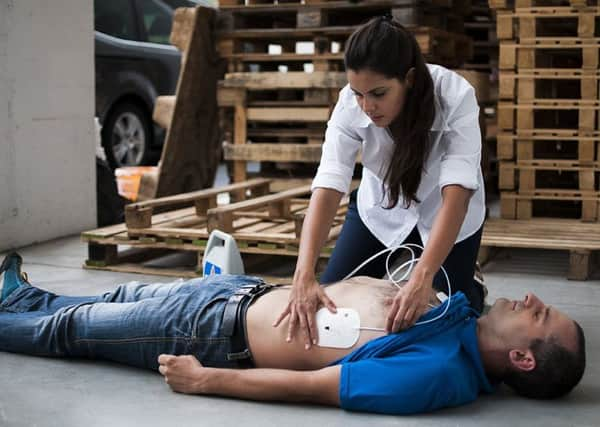Cardiac ignorance in the East Midlands is costing lives


Up to seven out of 10 people who suffer a cardiac arrest could survive if they are treated with a defibrillator inside the first five minutes – but more than two in five people in the East Midlands (42 per cent) have no idea where their nearest life saving equipment is, according to new research by St John Ambulance.
These findings come from a YouGov survey of 2,000 adults over the age of 18 in the UK, conducted for St John Ambulance in September 2017
Advertisement
Hide AdAdvertisement
Hide AdThe shocking statistic is revealed as the first aid charity warns that despite more than 30,000 people experiencing cardiac arrests every year in the UK, we are lagging way behind countries all over the world when it comes to knowing how to treat them.
The new survey also highlights that 60 per cent of people in the East Midlands wouldn’t know what to do if faced with a cardiac arrest; and while 82 per cent know what a defibrillator does, 70 per cent of people would not feel confident using one, plus an astonishing 52 per cent wrongly believe it could cause harm to a patient.
It also reveals that 80 per cent of out of hospital cardiac arrests occur at home.
The source for the above figures is from the Resuscitation Council (UK) Consensus Paper on Out-of-Hospital Cardiac Arrest in England.
Advertisement
Hide AdAdvertisement
Hide AdThe first aid charity announced yesterday (Monday) the launch of its C.A.R.E. for a Heart campaign – four steps to learn in advance, to give you and your loved ones the best chance of survival.
• C Closest defibrillator - Find your closest defibrillator
• A Arrest - Be ready to spot the signs of cardiac arrest
• R Resuscitate - Know how to resuscitate using CPR
• E Early defibrillation - Early defibrillation gives the best chance of survival
St John Ambulance regional director in the East, Jon Knight, said: “Our research shows that while most people have some awareness of defibrillators, we still have a long way to go in educating people about what they need to do in a cardiac emergency.
“Home is where the heart is; it’s also where the majority of cardiac arrests happen, outside of hospital, which means it’s more likely to be our friends, family – or even ourselves – who need first aid in this life or death moment. “None of us want to find ourselves in a situation where we couldn’t save a loved one’s life, any more than we’d want them to stand by helpless if we suffered a cardiac arrest.
Advertisement
Hide AdAdvertisement
Hide Ad“That’s why we are urging everybody to learn the four simple steps of C.A.R.E. today; so that if the worst happens tomorrow, we can all act quickly and confidently, especially when every second counts.’
St John Ambulance has made simple, fun, and shareable videos, to help you learn the C.A.R.E. steps.
Visit www.sja.org.uk/care to watch and share.